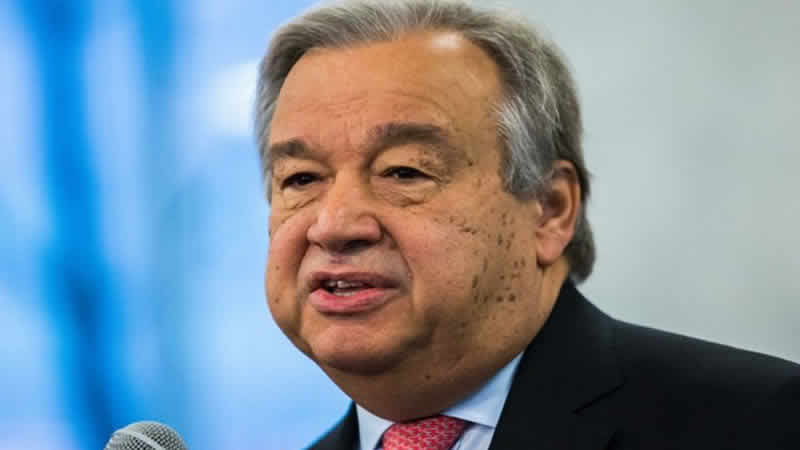UN Secretary General António Guterres urged India on Monday to end the use of pellets against children in Occupied Jammu and Kashmir and stop associating children with the security forces in any way.
The UN chief made these observations in his latest report on “Children and Armed Conflict” presented in the UN Security Council on Monday for an open debate. The report does not clarify how India has been associating children with the security forces.
The report revealed that last year, grave violations were committed against some 19,300 youngsters, particularly in war zones, such as Afghanistan, Syria and the Democratic Republic of the Congo.
“The disregard for children’s rights amid war and upheaval is shocking and heartbreaking,” Mr Guterres said during the high-level debate, held virtually. “Schools and hospitals [are] constantly attacked, looted, destroyed or used for military purposes, with girls’ educational and health facilities targeted disproportionately”.
The report’s chapter on India noted that a total of 39 children — 33 boys, six girls — were affected by violence in the occupied territory last year. Of them, nine were killed and 30 were maimed.
At least 11 were wounded by pellet guns. The report includes incidents of torture by security forces and unidentified perpetrators, injuries resulting from explosives, crossfire between unidentified groups and Indian security forces, crossfire between unidentified groups, and grenade attacks and crossfire and shelling across the Line of Control.
“I remain concerned by grave violations against children in Jammu and Kashmir and call upon the [Indian] government to take preventive measures to protect children,” the UN chief said. He urged the Indian government to “end the use of pellets against children” and to “ensure that children are not associated in any way to security forces”.
He also urged New Delhi to endorse the Safe Schools Declaration and the Vancouver Principles — an inter-governmental commitment to protect students, teachers, schools, and universities from the worst effects of an armed conflict.
“I am alarmed at the detention and torture of children and concerned by the military use of schools,” said the secretary general while urging the Indian government to “ensure that children are detained as a measure of last resort and for the shortest appropriate period”.
He also urged India to “prevent all forms of ill-treatment in detention” and to “ensure the implementation of the Juvenile Justice (Care and Protection of Children) Act, 2015, to address the use of children for illegal activities and the situation of detained children”.
According to the report, the United Nations verified the use of seven schools by Indian security forces for four months last year.
Schools were vacated by the end of 2020. The United Nations did not verify grave violations in the context of the Naxalite insurgency.
The United Nations also verified the recruitment and use of two boys by unidentified perpetrators and was reviewing reports of the use of three boys by Indian security forces for less than 24 hours.
Four children were detained by Indian security forces in Occupied Jammu and Kashmir for alleged association with armed groups, the report added.
Pakistan
In its Pakistan chapter, the report noted that 39 children were reportedly killed (8) and maimed (31) by unidentified perpetrators in Khyber Pakhtunkhwa, Azad Kashmir and Balochistan. Incidents included clashes across the Line of Control and improvised explosive devices.
One attack on a school was reported in Khyber Pakhtunkhwa when unidentified perpetrators placed an improvised explosive device.
The Global Polio Eradication Initiative reported 127 incidents by unidentified armed elements.
“I welcome the engagement of the [Pakistan] government with my Special Representative to develop preventive measures to protect children,” the secretary general said in the report.
“I reiterate my call for the government to better protect children through the endorsement of international commitments such as the Safe Schools Declaration and the Vancouver Principles.”











